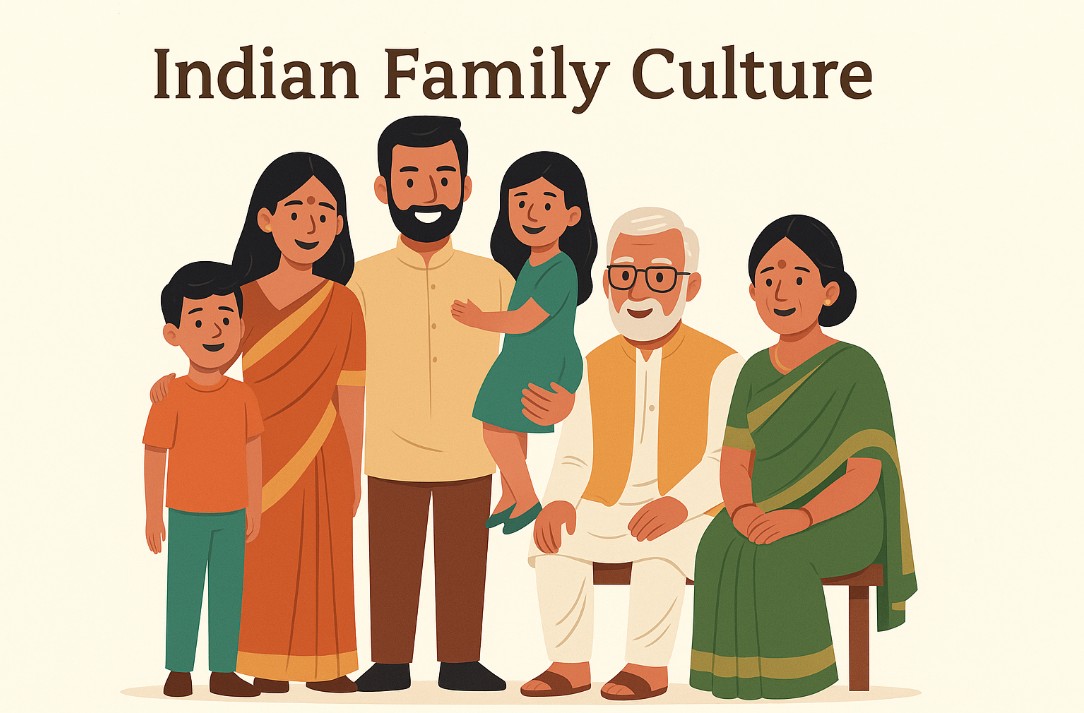Introduction
Welcome to MakeHappyFamily.co! We’re so glad you’re here to explore the heart and soul of family life. On our site, we celebrate what makes families strong, joyful, and united. Today, we invite you to discover the beauty of Indian family culture with us. 🌸
At MakeHappyFamily.co, we believe that Indian family culture is all about love, respect, and deep connections. Indian families are known for their warmth, traditions, and the way they support each other through every stage of life. Let’s take a sweet journey together and see what makes Indian families so special! 🏡
Indian Family Culture in America
Indian families who move to America bring their rich traditions with them. They often keep close ties with relatives in India, calling and visiting whenever they can. Even though they live far from their homeland, Indian families in America still celebrate festivals like Diwali and Holi, cook traditional foods, and teach their children the values of respect and togetherness.
Many Indian families in America continue to live in close-knit groups, sometimes with grandparents, parents, and children all under one roof. They support each other, share responsibilities, and make sure everyone feels included. At the same time, living in America means they also learn new ways and mix Indian traditions with American culture.
Children in Indian-American families often grow up speaking more than one language. They learn to balance their Indian roots with American customs, which helps them become open-minded and respectful of all cultures. Indian family culture in America is a beautiful blend of old and new, keeping the best of both worlds.
| Feature | Indian Families in America |
|---|---|
| Family Structure | Often extended, sometimes nuclear |
| Festivals Celebrated | Diwali, Holi, Raksha Bandhan, etc. |
| Language | English, Hindi, regional Indian languages |
| Food | Mix of Indian and American dishes |
| Values | Respect, togetherness, education |
| Living Arrangements | Sometimes multigenerational |
| Connection to India | Strong, regular calls/visits/remittances |
Indian family culture is deeply rooted in tradition. Families often live together in large groups, called joint families, where grandparents, parents, children, uncles, aunts, and cousins all share the same home. The oldest male, called the patriarch, usually makes important decisions for everyone. Respect for elders is a key value, and children are taught to listen and learn from their parents and grandparents.
Traditions are a big part of daily life. Families gather for meals, pray together, and celebrate festivals as a group. Weddings, birthdays, and religious ceremonies are grand events where everyone comes together. Arranged marriages are still common, with families helping to find suitable partners for their children.
Sharing is important in Indian families. Everyone helps with chores and supports each other in good times and bad. Even as India becomes more modern, many families keep these traditions alive. They believe that staying close and helping each other makes life happier and more meaningful.
| Tradition | What It Means in Indian Families |
|---|---|
| Joint Family Living | Multiple generations under one roof |
| Respect for Elders | Elders are loved, obeyed, and cared for |
| Arranged Marriages | Family helps choose life partners |
| Festival Celebrations | Whole family gathers for rituals and feasts |
| Sharing Responsibilities | Chores and duties are shared by all |
| Family Meals | Eating together is a daily tradition |
| Supporting Each Other | Emotional and financial help for all members |
Indian Family Culture and Tradition
Indian family culture is full of beautiful traditions that teach love, respect, and unity. In a typical Indian family, everyone has a special role. The father or eldest son is often the head, while the mother manages the home and cares for everyone. Grandparents are wise guides, sharing stories and advice with the younger generation.
Children are taught to greet elders with respect, help with household chores, and study hard. When a girl gets married, she usually moves into her husband’s family home, becoming part of a new family. Boys often stay with their parents even after marriage, bringing their wives to live with them.
Festivals are the heart of Indian family life. During Diwali, families decorate their homes with lights, cook sweets, and pray together. During Holi, everyone plays with colors and enjoys music and food. These celebrations bring everyone closer and create happy memories.
Even as families become smaller and more modern, the spirit of Indian family culture stays strong. The values of love, respect, and togetherness are passed down from one generation to the next, making Indian families unique and strong.
| Role in Family | What They Do |
|---|---|
| Father/Eldest Son | Head of the family, makes key decisions |
| Mother | Manages home, cares for everyone |
| Grandparents | Give advice, share stories, care for grandkids |
| Children | Learn, help at home, respect elders |
| Daughters-in-law | Join husband’s family, help with household |
| Sons | Support parents, stay with family after marriage |
FAQs
What makes Indian family culture unique?
Indian family culture is unique because of its strong focus on togetherness, respect for elders, and deep-rooted traditions. Families support each other in every way, making life happier and more secure.
How do Indian families celebrate festivals?
Indian families celebrate festivals by coming together, decorating their homes, preparing special foods, and performing religious rituals. Festivals are a time for bonding, joy, and making memories.
How does Indian family culture change in other countries?
When Indian families move to other countries, they keep their traditions alive while also learning new customs. They celebrate Indian festivals, cook traditional foods, and teach their children about their roots, blending the best of both cultures.
Thank you for visiting MakeHappyFamily.co! We hope you enjoyed learning about Indian family culture. Stay with us for more heartwarming stories and tips to make your family happy and strong! 🌟
Know More: Indian Family Culture

